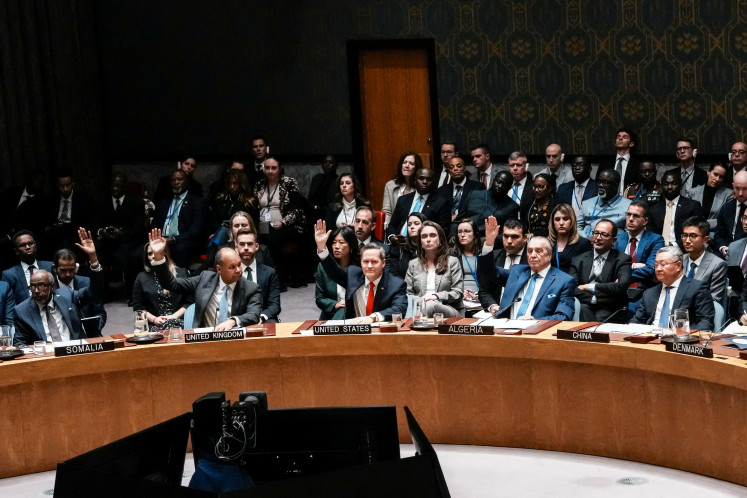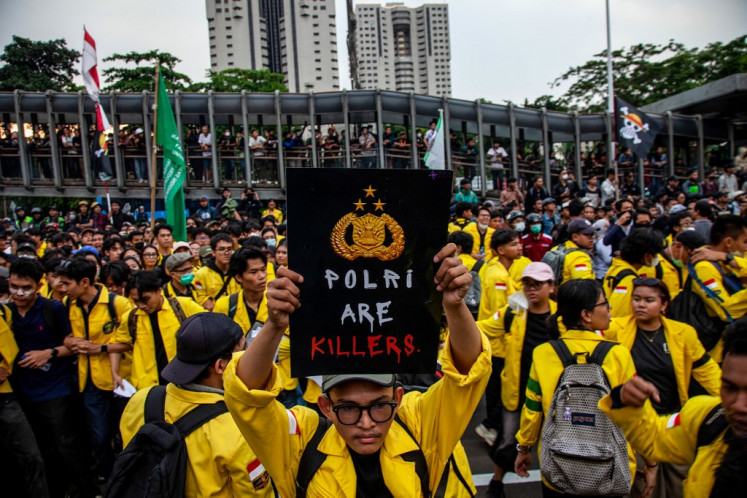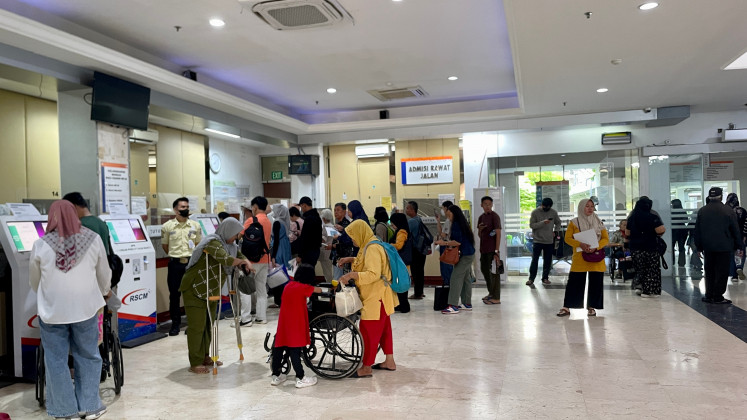Popular Reads
Top Results
Can't find what you're looking for?
View all search resultsPopular Reads
Top Results
Can't find what you're looking for?
View all search resultsWhy Indonesia needs ISPO
Sustainable palm oil and RSPOSustainable palm oil has been the topic of discussion among the members of the palm oil sector since 2003, the year when the players in the sector held the first meeting to set up is the Roundtable on Sustainable Palm Oil which was eventually formed a year later and registered in Zurich, Switzerland on April 8, 2004 as an association
Change text size
Gift Premium Articles
to Anyone
S
ustainable palm oil and RSPO
Sustainable palm oil has been the topic of discussion among the members of the palm oil sector since 2003, the year when the players in the sector held the first meeting to set up is the Roundtable on Sustainable Palm Oil which was eventually formed a year later and registered in Zurich, Switzerland on April 8, 2004 as an association. It was created by private stakeholders or the so-called B to B (business to business) establishment as no governments were involved.
The principal objective of RSPO is “to promote the growth and use of sustainable palm oil through co-operation within the supply chain and open dialog between its stakeholders.” The not-for-profit association will have members representing major players along the palm oil supply chain, namely the oil palm growers, palm oil processors and traders, consumer goods manufacturers, retailers, banks and investors, environmental/nature conservation NGOs and social/development NGOs. The RSPO is a unique platform for pragmatic co-operation to contribute to the expansion of sustainably produced palm oil and its uses.
The application of RSPO standards is voluntary for its members, although its members are recently required to implement these standards and given a time limit to apply the standards. As of Nov. 25, 2010, RSPO members from Indonesia totaled 74, consisting palm oil growers, processors, traders and NGOs. The total members of the association as of Nov. 25, 2010 reached 500; they include:
* Banks and Investor (8)
* Consumer Goods
* Manufactures (99)
* Environmental or Nature Conservation Organization (NGOs) (12)
* Oil Palm Growers (84)
* Palm Oil Processors and Traders (160)
* Retailers (22)
* Social or Development Organization (NGOs) (9)
The organization actively tries to increase public awareness of the need for sustainable palm oil and the need to preserve the environment along in conjunction with palm plantation activities. But until now, there is a lack of consumer awareness about sustainable products, especially if the prices of these products are higher than the non-sustainable products.
The challenges for Indonesia’s palm oil
In recent years, Indonesia’s palm oil sector has faced various problems, including never-ending allegations by NGOs, the strict demands from the RSPO and conditions imposed by the EU. The EU has issued the EU Directive on Promotion of the use of energy from renewable resources, amending and subsequently repealing Directive 2001/77/EC and 2003/30/EC (EU RED).
The RSPO has importantly ruled that any new plantation opening after 2007 is not allowed in primary forest and peat land and must protect the High Conservation Value, while the EU Renewable Energy Directive (EU RED) has set criteria on the use of palm oil as feedstock for biofuel production.
The EU RED rules a new plantation for biofuel raw material (not applicable only for biodiesel from palm oil but for all types of biofuels) which is opened after the year 2008 should not come from lands containing high biodiversity and land containing a high carbon stock. The regulation is pretty tough as it uses the forest definition in accordance with the provisions of the IPCC. In addition, the EU has set a target to achieve GHG emission saving of 35 percent by 2017. By 2020, the GHG saving emission should reach 60 percent. Palm oil biodiesel cannot meet this requirement because the default emission saving value is only 19 percent.
According to an EU study, only two commodities are not included in the category of 35-percent saving emission: palm oil and soybean biodiesels.
The EU RED will cover many new criteria and requirements related with biodiversity, such as the high biodiversity grassland, the Land Use Change (LUC) and Indirect Land Use Change (ILUC), for which the standard will be added later. This is a tough challenge for the producers of biodiesel and raw materials producers for biodiesel, especially those made from oil palm.
The next tough challenge is the Unilateral Commitment from the Indonesian Government made in the Copenhagen meeting in December 2009, pledging that Indonesia will reduce the contribution of GHG emissions in 2020 to 26 percent, by preparing the programs as specified in table A.
The emission reduction in Indonesia is set at about 26 percent, if there is assistance from developed countries, the reduction will increase to 41 percent. This percentage is based on GHG emission estimation in 2020. The programs will burden palm oil business in forest and peatland areas, as activities in the lands containing high carbon stock must be avoided.
In May 2010, Indonesia, represented by the Foreign Minister Marty Natalegawa and witnessed by President Susilo Bambang Yudhoyono, signed a Letter of Intent (LoI) on “Cooperation on reducing greenhouse gas emissions from deforestation and forest degradation,” in which new land opening should stop in 2011-2013.
Why Indonesia needs the Indonesia Sustainable Palm Oil System (ISPO)
Considering the above mentioned challenges and that all sectors need to support the commitment of the President of Indonsia, the agriculture minister has launched the ISPO which aims:
1. to support the commitment of the Presindent of Indonesia to reduce GHG emmissions made in Copenhagen and the Indonesia-Norway LoI in reducing GHG emissions
2. to raise the awareness of the importance of sustainable palm oil production and to accelerate the implementation of sustainable production system and certification
3. to enhance the competitiveness of Indonesian palm oil in world market
4. to reduce GHG emissions caused by the opening and the operation of oil palm plantations
The RSPO is quite a large organization, and has programs that can achieve these ends. Because it is a voluntary organization, the achievement can be slow, especially as the members from Indonesia total only 74 companies including growers, processors, traders and NGOs. While the number of plantations in Indonesia exceeds 2000, there’s great concern over when sustainable palm oil can be achieved. The ISPO does not impose a membership fee and will seek inexpensive certification costs, while the government may determine the certification component.
The terms and conditions of ISPO are no different from other environmental provisions, but there is a clear legal framework in the ISPO as it is based in Indonesia and concerns the Ministry of Agriculture, State Ministry for the Environment, the Minstry of Forestry and the National Land Agency.
Under such conditions, the obligations that must be met by oil palm plantations are:
1. Compliance with the legal licensing regulation
2. Responsibility to implement palm oil plantation management
3. Implementation of best practices in oil palm plantations and mills
4. Responsibility to implement regulations on environmental and conservation of natural resources
5. Responsibility toward employees
6. Responsibility to the individuals affected by oil palm plantations and mills
7. Long-term commitment to improve the economy
The ISPO implementation will follow the applicable provisions, which is primarily to classify plantations as follows:
1. The classification is based on the Decree of the Minister of Agriculture No. 7/2009
2. Plantations that have qualified in the classification process are those in grades I, II and III while those in grades IV and V will be reevaluated. Plantations that practice the slash and burn method of land clearing will be disqualified in this classification process.
3. Plantations are also required to obey the regulations set by the Ministry of Environment, Ministry of Forestry and the National Land Agency.
Classification scheme is described in Graph A.
ISPO certification will start with classification with the following points to be noted as follows:
1. Plantations that qualify to be classified as Class I, II or III according to the Decree of the Minister of Agriculture No.17/2009 (implemention is mandatory) can be certified in accordance with the Indonesia Certification System with ISPO as a reference
2. ISPO is an obligatory reference
3. A grace period of 3 years is given to allow companies to make adjustments with the ISPO requirements and tolerance is shown for those intending to implement ISPO. If companies need advocacy to meet the requirements, there will be assistance provided for six months to 2 years, with the expectation they will be able to implement ISPO
4. ISPO criteria for farmers is being prepared, and the classification for farmers, in accordance with the above decree of the minister of agriculture, is also in the process of being prepared.
Palm oil certified by other standards such as the RSPO will get simpler treatment:
1. Companies certified by other agencies such as the RSPO can be certified if they meet the grade I, II and III
2. ISPO team will examine the latest audit results
3. An audit will be conducted if the audit report is in accordance with the regulation, and only criteria of the other standards which are not in compliance with the Indonesian regulations will be audited by the certification body recognized by ISPO.
The ISPO certification mechanism is described in graph B:
Plantation that receives ISPO certification
1. The decision made by the ISPO Appraisal Commission is absolute and irrevocable
2. Complaints can be addressed to the ISPO secretariat by attaching latest evidence
3. The decision will be announced on the Intenet or in national newspapers
4. ISPO will be implemented in 2011

Because ISPO is the provision adopted by the Ministry of Agriculture, the implementation is mandatory, deviation will be subject to sanctions in accordance with prevailing regulations. In addition, this system will be notified to the World Trade Organization (WTO). This is an attempt to get a market guarantee, with the recognition of this system through the mechanism of the WTO and other multilateral or bilateral agreements with buyers. If the ISPO implementation causes Indonesia’s trade volume to decrease, there will be billateral or multilateral discussion. ISPO will hold a public consultation in 2011 to get feedback from all stakeholders.
The writer is Executive Chairman of Indonesian Palm Oil Commission
















